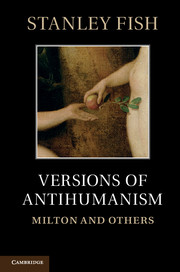Book contents
- Frontmatter
- Contents
- Acknowledgments
- Introduction: intention, historicism and interpretation
- Part I Milton
- Part II Early modern literature
- Chapter 8 “Void of storie”
- Chapter 9 Authors–readers
- Chapter 10 Marvell and the art of disappearance
- Chapter 11 Masculine persuasive force: Donne and verbal power
- Chapter 12 How Hobbes works
- Index
- References
Chapter 8 - “Void of storie”
the struggle for insincerity in Herbert's prose and poetry
Published online by Cambridge University Press: 05 May 2012
- Frontmatter
- Contents
- Acknowledgments
- Introduction: intention, historicism and interpretation
- Part I Milton
- Part II Early modern literature
- Chapter 8 “Void of storie”
- Chapter 9 Authors–readers
- Chapter 10 Marvell and the art of disappearance
- Chapter 11 Masculine persuasive force: Donne and verbal power
- Chapter 12 How Hobbes works
- Index
- References
Summary
“OH THAT I ONCE PAST CHANGING WERE”
In a somewhat neglected poem of George Herbert's entitled “A Dialogue Anthem,” two characters, Christian and Death, debate the shape of history, both personal and cosmic. Christian tauntingly asks, “Alas, poore Death, where is thy glorie? / Where is thy famous force, thy ancient sting?” and Death replies in kind, “Alas poore mortall, void of storie, / Go spell and reade how I have kill'd thy King.” We are meant to see, of course, that Death completely misunderstands or misreads the situation: he thinks that because Christ has died, there is no longer any center to Christian's life, nothing in relation to which his actions could have meaning; however, Christian knows that meaning, and the continuation of his story, is assured by Christ's death, an act of self-sacrifice that rescues man from the death-sentence (separation from deity) earned by Adam and Eve in Eden. It is only because of Christ's death that man will live.
But live how? The answer to this question reveals a further irony in Death's accusation, “void of storie”; for, correctly understood, it is not an accusation at all, but a precise specification of the requirement that Christ's sacrifice imposes, the requirement that the Christian not have a story of his own, that he be, in that impossible and perhaps inconceivable sense, void of story. The logic is familiar in Christian thought. It is present, for example, when Milton reminds us that the taste of the forbidden tree was “mortal” and brought Death into the world. The point is profound, if tautological: mortality is death in the sense that it names a state which is finite, which has an end, a cessation, a conclusion. Once separated from the endless rhythms of eternity, from that “Grateful vicissitude” in which change is “delectable” (PLv, 629) but not needed, man is delivered into a world where change always has reference to the pressures exerted by beginnings and ends. Mortal man always feels time's winged chariot at his back because as a creature whose mode of existence is linear every moment brings an opportunity that will not come again and also brings choices that are at once irrevocable and determining.
- Type
- Chapter
- Information
- Versions of AntihumanismMilton and Others, pp. 147 - 168Publisher: Cambridge University PressPrint publication year: 2012



